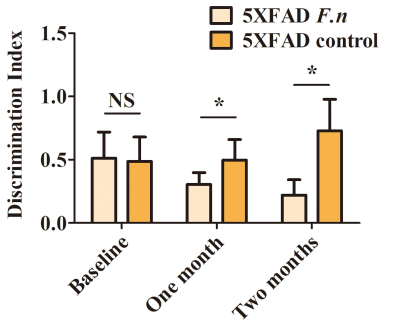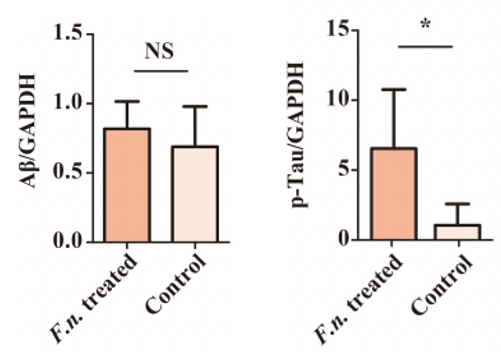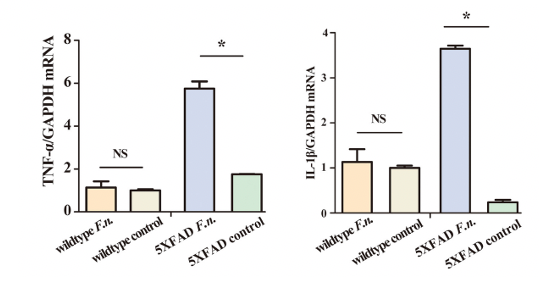Key Points:
- The gum disease-assocaited bacteria F. nucleatum lowers cognitive function in mice.
- The brain tissue of mice with gum disease exhibit significantly higher levels of amyloid beta (Aβ) and phosphorylated-tau (p-Tau), both hallmarks of Alzheimer’s disease progression.
- Mice with gum disease also have elevated brain inflammation.
The CDC confirms that nearly 50% of adults over the age of 30 have some form of periodontitis, the most prevalent oral inflammatory disease. Periodontitis is linked to a myriad of deadly diseases including cardiovascular disease and Alzheimer’s disease. Research indicates that oral bacteria are responsible for triggering periodontitis, and recent evidence suggests that F. nucleatum, an oral bacteria with strong ties to pregnancy complications, might be a driving force behind Alzheimer’s progression.
In a new study published in the journal Frontiers in Aging Neuroscience, researchers evaluated the effects of F. nucleatum on Alzheimer’s progression in an Alzheimer’s-mouse model. Wu and colleagues showed that infecting mice with F. nucleatum hampered cognition and boosted the levels of Aβ and p-Tau in the brain tissue of mice. Additionally, they found that infected mice displayed greater levels of brain inflammation than healthy mice, further demonstrating F. nucleatum’s harmful effects on the brain.
F. Nucleatum Increases Cognitive Impairment
To examine the clinical effects of F. nucleatum on cognitive function, Wu and colleagues conducted a novel object recognition task on mice infected with F. nucleatum. Here, mice were placed in an open box that contained novel objects, and investigators measured the time spent exploring each object. After one and two months, healthy mice spent more time with the novel objects compared to infected mice, indicating that infection with F. nucleatum hampers cognition.

Oral Infection Increases Aβ and p-Tau in Brain Tissue
Studies show that Alzheimer’s disease manifests through the abnormal accumulation of harmful Aβ proteins, which build up between neurons and impact cognitive function. What’s more, the accumulation of the phosphorylated version of the tau protein (p-Tau) aggregates to form structures called “tangles” that inhibit neuronal communication, another hallmark of Alzheimer’s progression. With this in mind, Wu and colleagues decided to look at the levels of Aβ and p-Tau in the brain tissue of mice. Investigators found that infected mice displayed significantly higher levels of p-Tau than healthy mice. Further results showed that infected mice also exhibited higher levels of Aβ, however, the difference was not statistically significant. Taken together, the findings demonstrate that F. nucleatum potentially contributes to the amplification of Alzheimer’s features.

F. Nucleatum Raises Brain Inflammation
Microglial cells are the resident immune cells of the central nervous system (CNS) and are critical for the health and maintenance of the CNS. Research shows that over-activation of microglial cells is an early indicator of Alzheimer’s and is responsible for the release of pro-inflammatory molecules like TNF-ɑ and IL-1β into the CNS. Notably, excessive TNF-ɑ and IL-1β secretion have been shown to mediate Aβ accumulation, ultimately leading to more Aβ plaque buildup.
Wu and colleagues previously confirmed that F. nucleatum promotes microglial activation in culture, so they wanted to see if infecting mice with F. nucleatum also changed the activity of TNF-ɑ and IL-1β. As expected, the brain tissue of healthy mice had drastically lower TNF-ɑ and IL-1β activity than infected mice. Overall, the findings suggest that F. nucleatum exacerbates brain inflammation through microglial activation and secretion of pro-inflammatory molecules.

Don’t Sleep on Oral Hygiene
Although age and genetics play a huge role in determining whether someone is at risk for Alzheimer’s, it appears that the oral pathogen F. nucleatum may be another key player in Alzheimer’s progression. Thus, we should continue striving to consistently maintain good oral hygiene to mitigate Alzhiemer’s progression and improve overall health. Like our parents always told us, make sure to brush your teeth once in the morning and once at night for two minutes and remember to floss after meals. Also, visiting the dentist at least once a year is vital in helping lower the risk of developing unwanted dental issues and potentially Alzheimer’s.